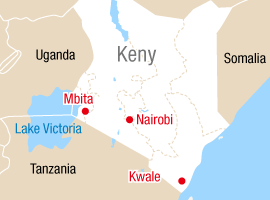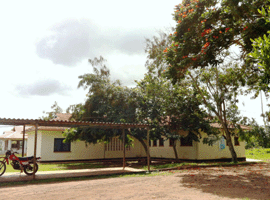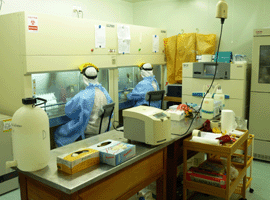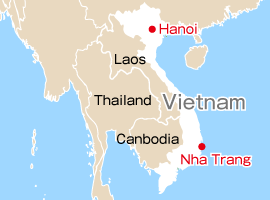Our overseas research stations are expanding with new projects
Nagasaki University has established research facilities with resident faculty in the Republic of Kenya and the Socialist Republic of Vietnam, which are advancing tropical medicine research in these regions, and which are also used for education and human resource development by the Masters Course in Tropical Medicine and the Graduate School of International Health Development. In 2011, it became possible for professors at both of these overseas facilities to instruct our graduate students, and the system was adjusted to enable graduate students to conduct field research in various African countries and Vietnam.
Nagasaki University Africa Research Station
Nagasaki University Institute of Tropical Medicine, Kenya Research Station

Our main office is in Nairobi and
our field stations are in Kwale and Mbita

Nairobi office
The Kenya Research Station started its research activities under a collaborative research project with Kenya Medical Research Institute (KEMRI) in 2005. We have been engaged in a program involving tropical medicine, emerging infectious diseases and clinical epidemiological research to establish an education and research system as part of a collaboration between Africa and Japan funded by MEXT. This project has three main goals: develop our educational research station in Kenya, perform research for treatment and prevention of tropical and emerging infectious diseases, and develop human resources. The Kenya research station has also been working on research activities in collaboration with Chiba University, Osaka City University, Fujita Health University and Nagahama Institute of Bio-Science and Technology.
- Field research station and activities

Mbita Laboratory
To achieve our goal, first we had to set up labs including a P3 lab in Nairobi as well as an office and labs at research sites in Mbita and Kwale. Second, we operate a Health and Demographic Surveillance System (HDSS) at field sites in Kwale and Mbita, while we also set up a Malaria Surveillance System (MSS) at the Mbita field site to collect and analyze data on malaria mosquitos. Third, a grass-roots project by JICA is being carried out in Mbita targeting school for promotion of public health in this area.
- Research for tropical diseases

Our staff and local staff working together
on the HDSS
In 2012, we started the SATREPS project for the development of rapid diagnostics and the establishment of an alert system to identify outbreaks of yellow fever and rift valley fever in Kenya, part of a larger project targeting multiple neglected tropical diseases. This system is also supported by JST. There are a total of ten research groups under the auspices of the Kenya research station.
- Educational programs
As a part of our educational program, we provide opportunities to our students in the doctoral course and masters of public health course to research in Kenya for tropical medicine and international health. Also, we accept undergraduate medical students from other universities in Japan and give field trainings in tropical medicine. We encourage Kenyan researchers as well to take educational opportunities, here, and now at The Institute of Tropical Medicine in Nagasaki, some Kenyan students are studying in the Masters of Tropical Medicine and RONPAKU program.
For departments of Nagasaki University other than the Institute of Tropical Medicine, we established an Africa station in 2010 to provide a base of operations for their researchers in Kenya. The School of Health Sciences has joined, and we are exploring the possibilities of expanding areas of research. Our research is taking place not only in Kenya but also in other African countries, such as the JSPS-JICA project for vector studies in Malawi. We are also expanding our activities to South Africa.

Kwale Laboratory

P3 Laboratory(Nairobi)
Vietnam Research Station
Institute of Tropical Medicine, Nagasaki University

Our NIHE Vietnamese research station
is located in Hanoi,
and our Nha Trang annex is in Nha Trang

National Institute of Hygiene and Epidemiology,
Vietnam (Headquarters)
NEKKEN and the National Institute of Hygiene and Epidemiology, Vietnam (NIHE) have jointly conducted a project from 2005 on clinical and epidemiological research on Emerging and Re-emerging Infectious Diseases (ERID) granted by the Ministry of Education, Science, Culture and Technology (MEXT) of Japan. Consequently, our Vietnam Research Station was established, and a number of research activities are being conducted by investigators from both NEKKEN and NIHE.
- Research activities
The objectives of the entire project are to clarify the ecology of pathogens in nature and in human society, to clarify the pathogenic mechanism of human diseases, and to develop an intervention-based method to inhibit the spread of infectious diseases. The project has 4 research groups with 4 different objectives.

National Institute of
Hygiene and Epidemiology (NIHE)

Laboratory
- Diarrhea Research Group
1) To conduct a molecular epidemiological study on kinetics of enteropathogens after rotavirus vaccine intervention, 2) To conduct a molecular epidemiological study of Vibrio cholera in ecosystems in Vietnam, and 3) To look at Human animal interface and diarrhea causation in Vietnam.
- Vector-Borne Infectious Diseases Research Group
1) To study the biological properties, virulence and ecological significance of dengue viral quasispecies in mosquito vectors and humans, 2) To survey Japanese encephalitis virus migration, 3) To study the influence of arbovirus on seasonal encephalitis of unknown origin 4) To survey climate change, mosquito vectors, and virus infection, 5) To study mosquito vectors, pathogenic mechanisms of dengue fever, and anti-infection measures.
- Clinical Research Group
1) To conduct pediatric acute respiratory infection cohort research studies, 2) To conduct birth cohort studies, 3) To do an immunogenetical analysis of severe dengue fever at Choray Hospital, 4) To establish a clinical and epidemiological research data collection system for analysis of fevers of unknown origin.
- Zoonosis Research Group
1) To conduct a viral epidemiological study of bat-borne infectious diseases, 2) To conduct a molecular epidemiological study of rabies, 3) To conduct an epidemiological study of hantavirus, 4) To develop human monoclonal antibodies with neutralizing activity against avian influenza (H5N1) strain, 5) To conduct an epidemiological study of avian influenza.
- Nha Trang annex

The Vietnam Research Station of Nagasaki University opened a branch in July 2006 in the Khanh Hoa Provincial Health Department in Nha Trang City in central southern Vietnam as a base for the field clinical epidemiology research activities of Nagasaki University. Pediatricians have been transferred from Japan on a long-term basis since 2009 to initiate surveys on the causes of neonate deaths.
Vietnam Research Station /
Institute of Tropical Medicine, Nagasaki University





